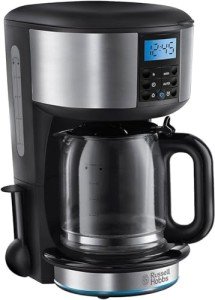The Rise and Reign of Coffee Brewers: A Comprehensive Guide to Brewing Perfection
Coffee is more than simply a drink; it's a ritual that lots of all over the world value. Whether it's the very first cup to kickstart the day or a mid-afternoon pick-me-up, the technique of preparation considerably affects the flavor and total experience of coffee. Coffee brewers have progressed significantly throughout the years, from traditional drip machines to sophisticated espresso makers, making it necessary for coffee enthusiasts to comprehend the various types readily available and their special benefits.
The Evolution of Coffee Brewing Methods
Coffee brewing has a rich history that spans centuries. The technique utilized often shows cultural traditions and advancements in innovation. Here, we will explore some of the most prominent coffee developing approaches, their advantages and disadvantages, and which type of maker may match different lifestyles and preferences.
1. Drip Coffee Makers
The drip coffee maker is one of the most popular brewing methods, particularly in families and workplaces.
Pros:
- Simple to use: Just include water and coffee premises.
- Perfect for developing numerous cups at as soon as.
- Consistent taste with automatic temperature control.
Cons:
- Limited control over developing time and temperature.
- Usually needs filtered coffee, which some might find limiting.
2. French Press
The French press, also called a press pot or plunger pot, is preferred by numerous for its abundant taste extraction.
Pros:
- Allows for complete control over brewing time.
- Produces a thick and delicious cup of coffee.
- No requirement for paper filters, which is environment-friendly.
Cons:
- Requires more manual effort than automatic machines.
- Can lead to sediment in the bottom of the cup.
3. Espresso Machines
Espresso machines range from manual to completely automated systems developed to produce focused coffee shots.
Pros:
- Versatile: Can make espresso, coffees, lattes, and more.
- Develops abundant, strong tastes and a velvety crema.
Cons:
- Typically more pricey and needs more knowledge to operate.
- Cleaning and upkeep can be more complicated.
4. Pour-Over Coffee Makers
Pour-over techniques like the Chemex and Hario V60 have actually gained traction for their capability to brew a clean and aromatic cup.
Pros:
- Provides excellent control over the developing procedure.
- High-quality flavor extraction when done correctly.
Cons:
- Time-consuming and needs skill to best.
- Not perfect for producing large quantities.
5. Cold Brew Coffee Makers
Cold brew is made by steeping coarsely ground coffee in cold water, producing a smooth, less acidic beverage.
Pros:
- Smooth and rejuvenating, with lower level of acidity compared to hot brew.
- Can be made in large batches and saved for days.
Cons:
- Requires sophisticated preparation, as steeping can take 12 to 24 hours.
- Some may dislike the distinct taste profile.
| Brewing Method | Pros | Cons |
|---|---|---|
| Drip Coffee Maker | Basic, brews several cups | Limited control |
| French Press | Complete control, rich flavor | Manual effort needed |
| Espresso Machine | Versatile, abundant tastes | Higher cost and intricacy |
| Pour-Over | Exceptional control, high-quality taste | Lengthy, skill-dependent |
| Cold Brew | Smooth, low level of acidity | Long brewing time, distinct taste profile |
Selecting the Right Coffee Brewer
When choosing a coffee brewer, numerous factors should be thought about:
- Brew Size: How many cups do you usually make at the same time? For those developing for a crowd, a drip coffee maker or a larger French press might appropriate.
- Time Commitment: How much time are you happy to dedicate to brewing? If time is of the essence, automatic machines may be more suitable.
- Taste Preferences: Do you enjoy complex tastes and boldness? Dual Coffee Makers or pour-over technique may be ideal.
- Budget: High-quality coffee machines can vary substantially in rate, so identifying your budget plan will narrow down choices.
- Space: Consider the countertop space offered in your cooking area, as some brewers can be rather large.
FAQs About Coffee Brewers
1. How do I clean my coffee brewer?
Many coffee machine have specific cleansing instructions in their handbooks, however basic techniques include:
- For drip coffee makers: Run an option of vinegar and water through the brew cycle followed by clean water.
- For French presses: Disassemble the plunger and clean it under warm water utilizing a soft sponge.
2. How typically should I replace my coffee maker?
Typically, coffee machine can last anywhere from 5 to 10 years with correct care. If you discover a decrease in the flavor of your coffee or relentless concerns with functionality, it might be time for a replacement.
3. Can I utilize routine coffee with an espresso machine?
Yes, you can use regular coffee, but it won't yield the very same concentrated taste profile as utilizing espresso roast coffee particularly developed for such machines.
4. What is the very best coffee-to-water ratio for brewing?
A general guideline is the "Golden Ratio" of 1:16, which is one part coffee to 16 parts water, but experimentation may lead you to your individual preference.
5. Are costly coffee machine worth it?
Higher-end coffee machine often have much better construct quality, more features, and provide better flavor control. Nevertheless, "worth it" can be subjective based on private needs and spending plan.
The variety of coffee brewers readily available today permits lovers to explore and experiment with tastes, techniques, and developing times, making every cup an unique experience. Whether going with a simple drip machine or mastering the art of espresso developing, the journey of producing the ideal cup of coffee continues to progress. By understanding the different developing approaches and their characteristics, people can make educated decisions that improve their everyday coffee routine and appreciation. After all, the ideal brewer can make all the difference in enjoying that much-loved cup of joe.

